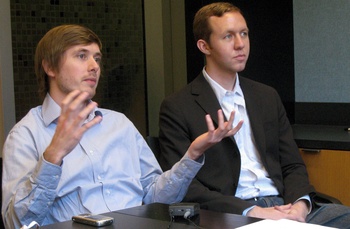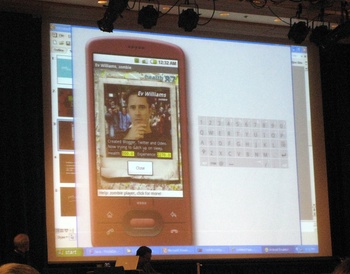 While the Supernova conference is mostly about the future of the network, a part of that network is mobile. And if you listen to most attendees, the two most important mobile players right now are Apple and the iPhone and Google and Android.
While the Supernova conference is mostly about the future of the network, a part of that network is mobile. And if you listen to most attendees, the two most important mobile players right now are Apple and the iPhone and Google and Android.
Oddly, it’s as if two other established players — Nokia and Research in Motion — have been relegated to the sideline as also-rans. One conference attendee even asked during a discussion about the future of mobile, “Is Blackberry dead?”
Hardly.
At least judging by the activity and logic of a few developers attending Supernova. They were invited not to show off their products as much as their ideas, and these are being developed just as much for the Blackberry and Nokia as they are for the iPhone and Android.
“There used to be a saying that nobody was going to be fired for buying IBM, at least in software,” said Peter Nofelt, one of the developers of the zombie-themed, social game MobileDead.
“It’s the same thing for the Blackberry. It’s a system that works great. People who aren’t even very technically inclined like partners in law firms and financial institutions that are 40 years old, you see them on the subway or in the streets using their Blackberries. They may not use the whole feature set but it fulfills their needs and they are comfortable with it.”
 Nofelt and his fellow developer Mark Wyszomierski are in their 20s and work in New York City, home to a few cell phone users. To these guys “the cell phone world is quite fractured and not easy to develop for.”
Nofelt and his fellow developer Mark Wyszomierski are in their 20s and work in New York City, home to a few cell phone users. To these guys “the cell phone world is quite fractured and not easy to develop for.”
There’s the iPhone, but it hasn’t reached critical mass or the installed base of the Blackberry. Also, Apple is tightly controlling third-party applications through its distribution point, iTunes. A mobile social game that’s part Facebook, part phone, and part George Romero’s “Night of the Living Dead” may not get Apple’s blessing to sell on iTunes or promotional backing.
There’s Android, but there are not any Android-powered phones available and there won’t be until the end of 2008 and into 2009. Even when there are, Nofelt and Wyszomierski note, developers don’t know how their programs will work on real phones from different manufacturers.
 “Android is a great platform to prototype ideas on,” Wyszomierski said. “But you cannot put all your time and effort into it as the platform will not be ready until 2009.”
“Android is a great platform to prototype ideas on,” Wyszomierski said. “But you cannot put all your time and effort into it as the platform will not be ready until 2009.”
And there’s Nokia, the number one handset maker in the world. However, Nokia’s availability and presence in the U.S. is fragmented. Nokia also sells expensive high-end phones like the N95 that will run $500-$600 after signing up for a subsidized contract. In their informal research, Nofelt and Wyszomierski are seeing younger people go for the coolness of the iPhone or the value of the Blackberry.
(For the record, Nofelt and Wyszomierski did not mention developing their application for phones that run the Windows Mobile operating system, which is on hundreds of handsets worldwide.)
“The Blackberry is a mid-level smartphone right now,” Nofelt said. “We know with the UI stuff we have to do a lot of legwork, but it’s a solid system. It is very strong.”
To hedge their bets, Nofelt and Wyszomierski and other mobile developers are putting as much of their code — if applicable — on the server side and then writing a “presentation layer” for each phone. This way, they do not have to write their programs from scratch for each operating system.
“It’s the only way to do it now, otherwise you will drive yourself insane,” Wyszomierski said.
What’s interesting about Nofelt and Wyszomierki developing for the Blackberry is that it is mostly considered a corporate device — and how many day traders and lawyers are going to play a zombie/social mobile game? Even so, while Apple is going after RIM’s corporate business, so too is a more consumer-friendly Blackberry (like the Pearl) taking on the iPhone.
“We are about what people actually have in their hands right now that we can get out there and show that our ideas can fly,” he said.
